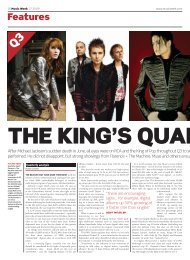Remake, Remodel: The Evolution Of The Record Label
Remake, Remodel: The Evolution Of The Record Label
Remake, Remodel: The Evolution Of The Record Label
Create successful ePaper yourself
Turn your PDF publications into a flip-book with our unique Google optimized e-Paper software.
This pre-draft version is strictly for review purposes only and is not for general dissemination or sharing.<br />
‘I am very happy with the digital download market,’ he says, ‘but then our fans tend to<br />
buy more albums. Our tracks-to-album ratios are about 2.5 to 1, whereas for majors it’s<br />
more like 12 to 1.’<br />
Clearly the alternative music repertoire of the Beggars Group lends itself naturally to the<br />
album format, and the label group has made a deliberate policy to put more of the focus<br />
for sales on to the album format. This leaves singles primarily as snapshot showcases for<br />
the album, rather than important revenue streams in their own right. This is in marked<br />
contrast to the strategy of labels with a more pop or urban flavour.<br />
Release schedules<br />
Digital formats enable artists and labels to optimise release dates as there aren’t the<br />
huge stock commitments and movements as with the physical world. Also, digital sales<br />
themselves can provide up-to-the-minute market information to inform and modify the<br />
marketing plan.<br />
Universal saw the rapid online take-up of the singles by new artist Jessie J and<br />
successfully brought forward her planned album release by a month in February (2011).<br />
As David Joseph says of the decision and the online analytics that informed it, ‘<strong>The</strong><br />
internet is telling you when to release something and when not to.’<br />
Music discovery<br />
<strong>The</strong> internet has created many new ways of discovering music and many of our<br />
interviewees commented on how healthy this was, especially in leveling the playing field<br />
for artists, and enabling artists to succeed on merit – rather than by dint of huge<br />
marketing budgets.<br />
Martin Mills notes, ‘<strong>The</strong> beauty at the moment is that the two big digital payers –<br />
iTunes and Spotify – are pretty much barrier-free, be you a big player or a small<br />
player.’<br />
Music discovery in the past was mainly through radio, TV and the press, with bigger<br />
companies being able to ‘work’ these channels better than small labels because of their<br />
scale and budgets.<br />
Different types of discovery mechanisms exist in the digital space and are changing the<br />
landscape completely. <strong>The</strong>y include:<br />
Blogs – where hundreds of music fans recommend their favourite music to those<br />
who find them, with services like the Hype Machine and elbo.ws aggregating<br />
what is happening on blogs and ranking the most popular and written about new<br />
acts;<br />
iTunes Genius – an algorithm designed to assess what is in your iTunes library<br />
and recommend similar music (the recommendations tend to be driven by<br />
genre). Apple also launched its own social network within iTunes called Ping in<br />
late-2010 which links through to Twitter and lists what music people are buying<br />
or liking;<br />
44



